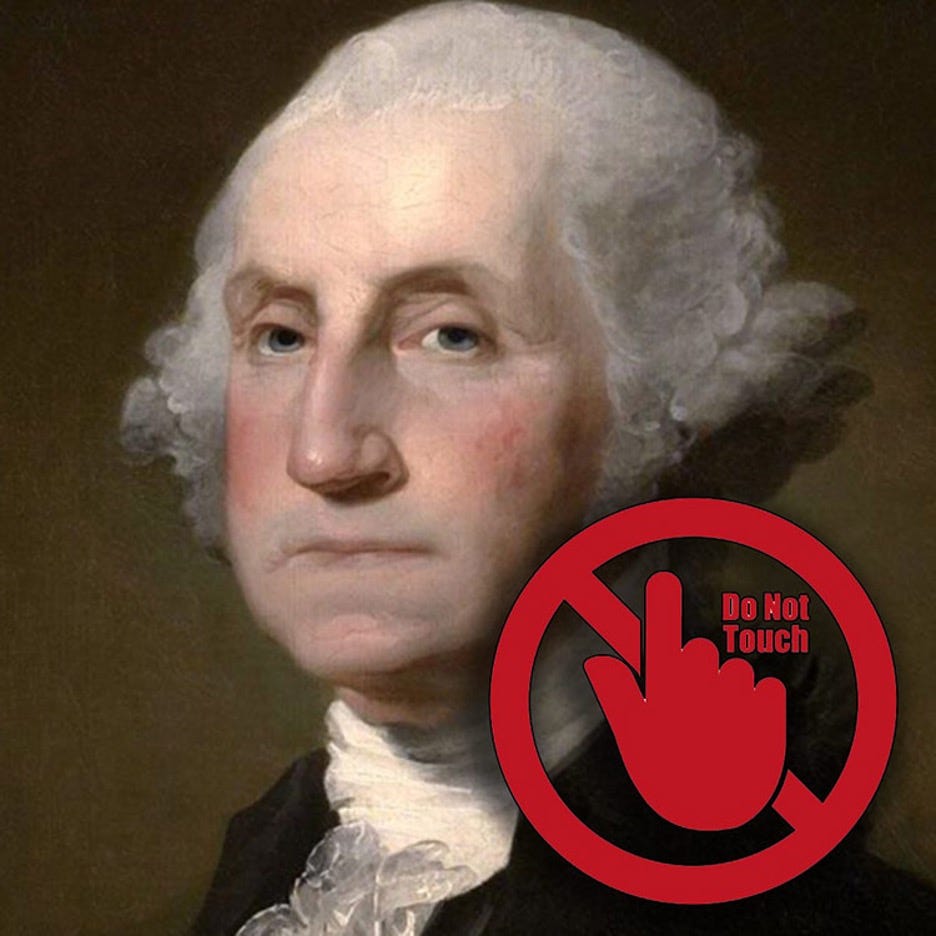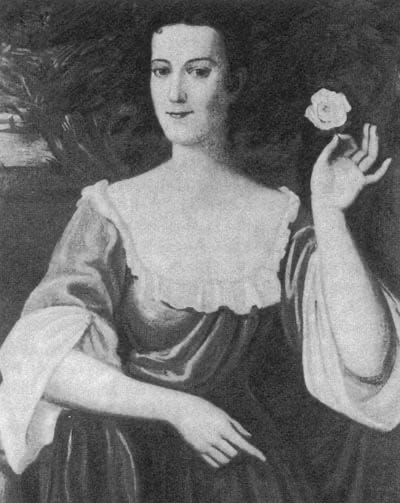8 Facts They Didn't Teach You About George Washington
In honor of Presidents Day, I thought I’d share with you eight surprising things I’ve learned about our first President, George Washington. Washington is one of my biggest heroes. As such, I’ve devoted many hours to reading about his life. He was a driven, self-made man and a great leader. His biggest flaw was that he was a slave-owner. Despite this troubling transgression of human rights, he still possessed many admirable qualities. This article isn’t meant to extol Washington’s virtues or castigate him for his vices. I hope, however, that it humanizes him and draws you closer to knowing the man that, as much as any, helped found our republic.
1. Our First President Did Not Like People Touching Him
An early story, probably apocryphal, said that one man goaded another to give George Washington a friendly slap on the back and ask him how it was going. Washington, the story goes, glared in silent rage at the offending individual.
While this story’s authenticity is doubted, there is no doubt that our first President did not like to be touched. At levees held at the first executive mansion on Cherry Street in Manhattan, President Washington often held a ceremonial sword in his right hand so he would not have to shake hands.
2. George Washington Was In Love With Another Woman When He Married Martha Custis
Right up until his wedding to the widower Martha Dandridge Custis, he wrote letters to a woman he had known since childhood: Sally Fairfax. In the letters, Washington was careful to never explicitly state his feelings for the married Sally Fairfax. However, you don’t have to reach into them very much to understand his deep affection for his childhood friend.
The coquettish Sally never returned Washington’s amorous feelings. However, upon her death in London many years later, these “love letters” were discovered by her children. Having kept the letters for decades, she must have treasured them very much.
3. He Did Not Like To Be Spoken To Informally
Just as giving George Washington a friendly slap on the back was off limits, so was speaking casually with him. He preferred people address him with whatever title he carried at the time. Once he became the commanding general of the Continental Army, people would address him as “Your Excellency” and refer to him as “His Excellency.”
This rigid formality created an environment where he commanded a tremendous amount of respect among his peers. But although people admired him, not many people loved him. He was simply too stiff to earn people’s outright affection. Washington’s stand-offish nature would certainly prevent him from finding success in modern-day politics.
4. George Washington Was a Spendthrift
Today, when we think of Washington or his home at Mt. Vernon, we imagine a genteel, wealthy Virginia planter. Washington was successful in creating an appearance of wealth. However, he was frequently in dire financial straights. Surprisingly, Washington had to borrow a large sum of money so that he could afford traveling to Manhattan for his own inauguration.
Washington, like many Virginia planters at the time, was land rich but cash poor. He would regularly berate his business partners in London for not fetching a high enough price for his crops. He also complained about the overpriced merchandise they sent back from London. For such a wise man, Washington never accepted blame or responsibility for his monetary travails. He’d blame drought, pests, or crooked business people, but never himself. He also never slowed down in his profligate spending.
5. Ceremonial Duties Were the Bane of Washington’s Existence
As many politicians can attest, ceremonial functions can be a drag. Washington especially hated them. He was America’s first superstar and therefore found them almost unavoidable. Everywhere he went, people honored him with banquets, celebrations, and dances. As he approached a town while traveling, the town’s leaders rode out to greet him. They often sent a ceremonial team of cavalry to escort him into town. Towns often planned a departing ceremony as well for the next morning. These constant parades were a thorn in Washington’s side for most of his life.
Washington bypassed towns when he could. To dodge an early morning ceremony, he rose before dawn and slipped out before the town stirred awake. Despite his slipperiness, he never fully escaped the loving embrace of his countrymen.
6. Washington Was America’s First Spymaster
Washington ran a vast array of spies who reported on enemy troop movements, morale, supplies, and more. He was wise enough to convince the Congress to dedicate a substantial amount of money for the payment of spies for their services, even when guns, blankets, and clothing were in short supply for his regular troops.
7. George Washington Was “Only” 6′ Tall
Many history books refer to Washington as being at least 6′ 2″ in height. The most likely source of this misinformation was the improper measurement of his corpse upon his death. Numerous records survive of Washington’s detailed instructions to London tailors. In all of them, he describes his height as being 6 foot. As meticulous as Washington was, it is better to believe his correspondence than his doctor’s notes. Being 6 feet in height, he would have towered over most men of his day. He certainly was tall, just not six feet, two inches tall.
Washington had very odd dimensions for a man of his size: his head was small, his shoulders narrow, his hips and thighs very wide. His measurements were so peculiar that his London tailors didn’t trust them. Sometimes, they would make his clothing as they thought his measurements must be instead of how he supplied them. This would result in a scornful letter making its way from tidewater Virginia, across the Atlantic, to his London tailors.
8. Washington’s Mother Was an Oddball, And May Have Been a Tory
Washington had great respect for his mother. However, it is doubtful that he loved her very much. Mary Ball Washington always resented her son for “leaving her” to pursue glory in battle or to lead our young nation. This would be the cause of a strained relationship that would last her entire life.
Strangers would sometimes comment to her, upon learning of who she was, that she must be very proud of His Excellency, the General, or His Excellency, the President. “His Excellency!” she would scoff and then complain about how the only thing her son had done was neglect her. Also, many people reported hearing her make comments that lead them to suspect she was loyal to the King of England.





It was Gouverneur Morris who went up to Washington a gave him and slap on the back. He was bet a dinner to do it, to prove he was "close" to the "chief". But because of the stare Washington gave Morris, he later said he wouldn't do it again for a thousand dinners.